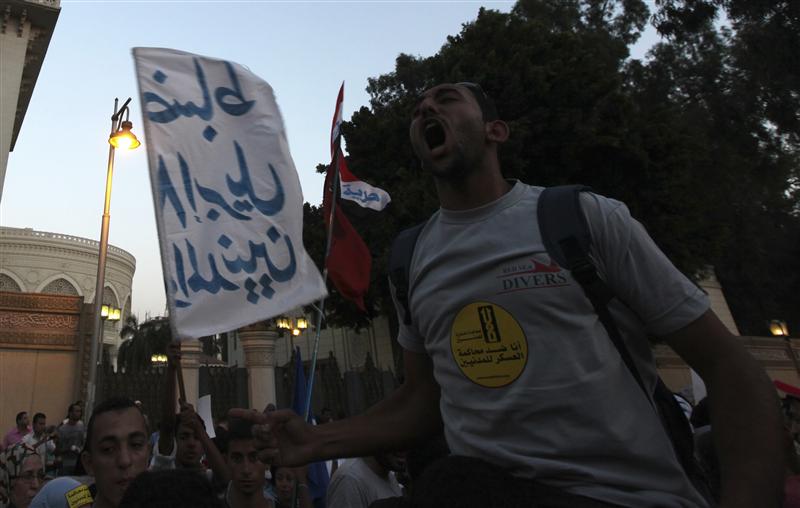Latest NEWS
- Aswat Masriya, the last word
- Roundup of Egypt's press headlines on March 15, 2017
- Roundup of Egypt's press headlines on March 14, 2017
- Former Egyptian President Hosni Mubarak to be released: lawyer
- Roundup of Egypt's press headlines on March 13, 2017
- Egypt's capital set to grow by half a million in 2017
- Egypt's wheat reserves to double with start of harvest -supply min
- Roundup of Egypt's press headlines on March 12, 2017
UPDATE - Military tribunal preliminarily sentences 7 to death

Activists chant against military trials for civilians by the presidential palace - Reuters
By Rana Muhammad Taha
CAIRO, Aug 26 (Aswat Masriya) – A military tribunal referred on Tuesday seven people to the Grand Mufti to consider sentencing them to death on charges relating to terrorism.
The military tribunal postponed its sentence regarding two more defendants in the same case to September 23.
The Mufti is Egypt's top religious authority; his decisions are not legally binding, although it is customary for the court to adopt them.
The defendants were arrested after a weapons' warehouse was attacked in Qaliubia on March 19, in an incident which left two military officers killed, reported state-run al-Ahram.
Nasser Ahmed, a lawyer representing one of the defendants, denied to Aswat Masriya that the nine defendants were implicated in the case. He said that his client, Ahmed Abu Sreei, was in Turkey at the time the incident took place.
The defendants are accused of the murder of armed forces personnel, resisting authorities and possession of rifles, Ahmed said.
After the court takes the Grand Mufti's opinion, the defendants are allowed to appeal their verdict, Ahmed said.
They are facing trial in two other court cases; one of which involves accusations that they belong to the militant group Ansar Bayt al-Maqdis, according to Ahmed.
The militant group has claimed responsibility for several terrorist attacks in Cairo and Sinai, including an attempt on Interior Minister Mohamed Ibrahim's life last September.
No Military Trials for Civilians, a group campaigning against referring civilians to military tribunals, strongly condemned Tuesday's sentencing.
Sara al-Sherif, No Military Trials member, said that the group's concerns regarding the military trials of civilians increase when death sentences are involved.
"We call for the defendants' retrial in a civilian court," Sherif said.
Article 204 of the new constitution allows referring civilians to military trials "in cases which represent a direct assault on armed forces institutions, their camps or anything that falls under their authority, alongside assaults on military or border zones, and military institutions, vehicles, weapons, ammunition, documents, secrets, public funds, or factories."










